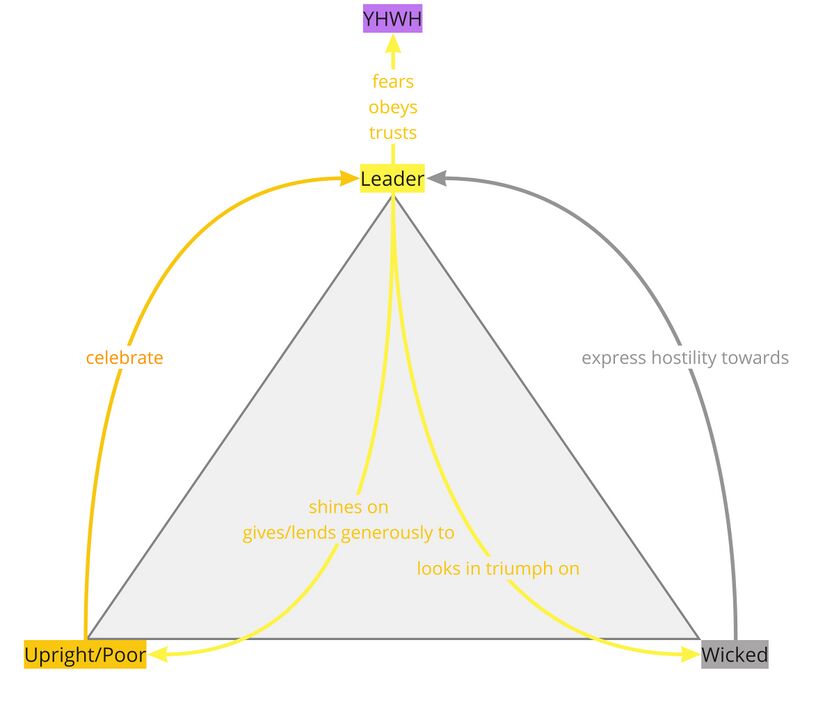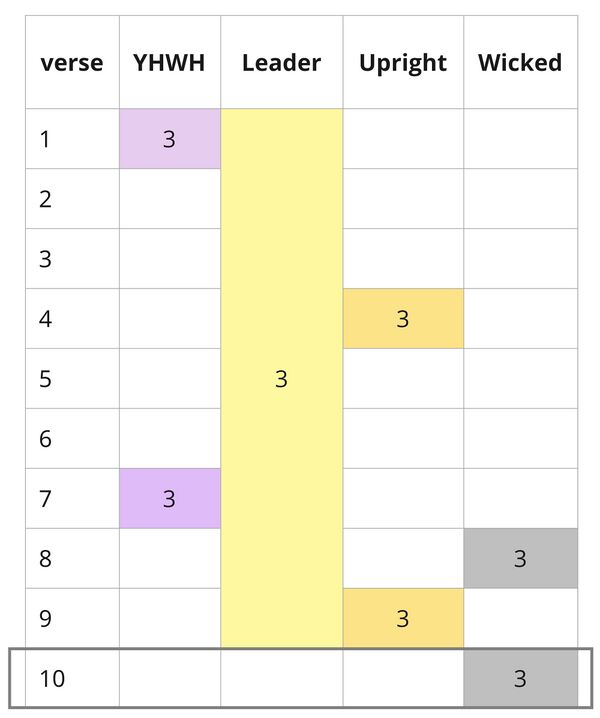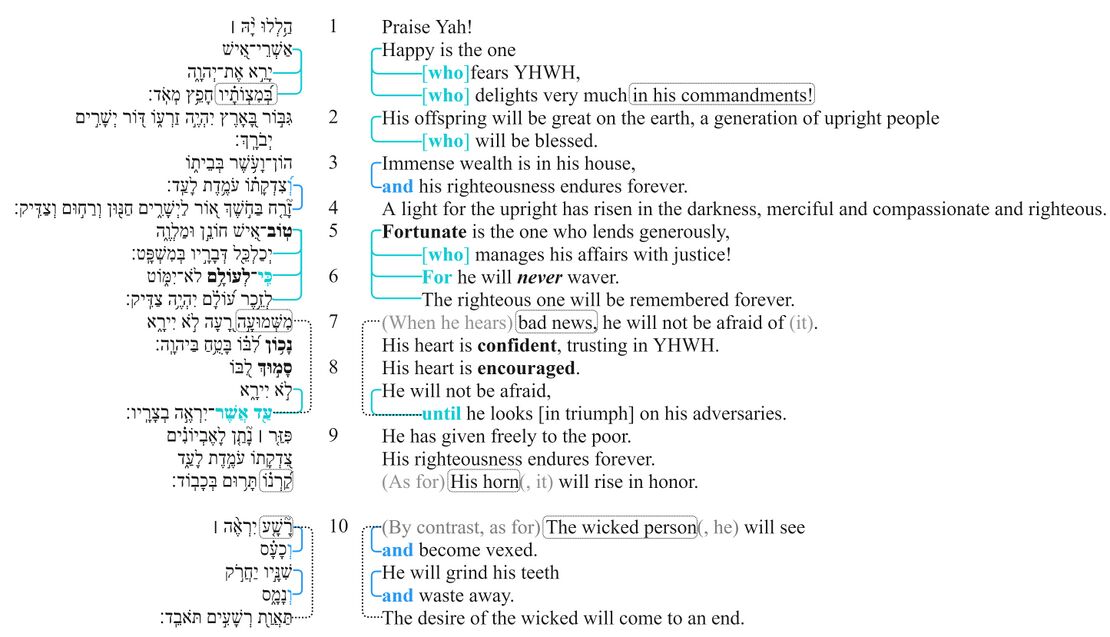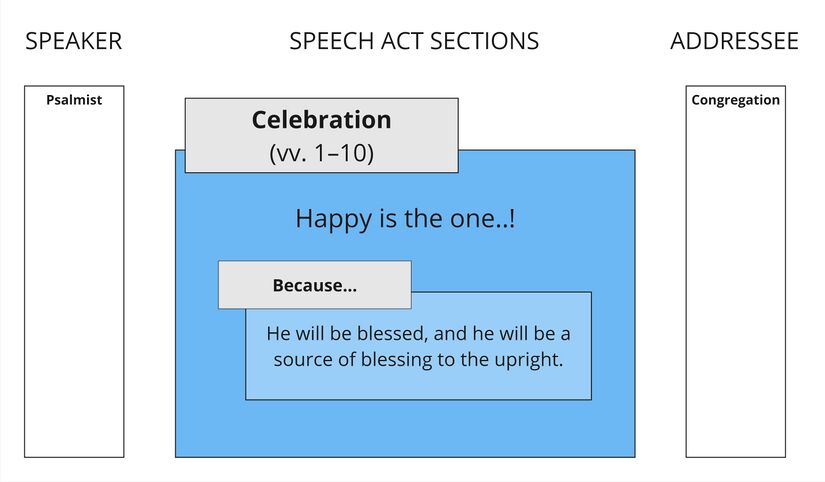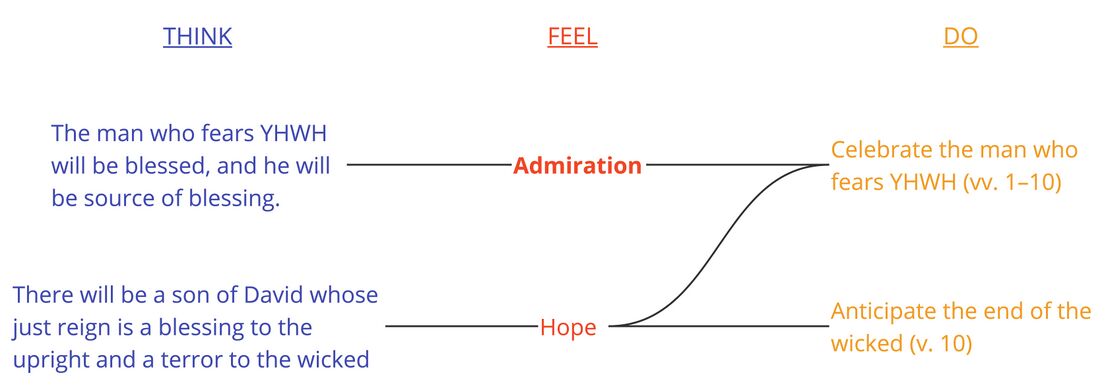Psalm 112 Discourse
About the Discourse Layer
Our Discourse Layer includes four additional layers of analysis:
- Participant analysis
- Macrosyntax
- Speech act analysis
- Emotional analysis
For more information on our method of analysis, click the expandable explanation button at the beginning of each layer.
Participant Analysis
Participant Analysis focuses on the characters in the psalm and asks, “Who are the main participants (or characters) in this psalm, and what are they saying or doing? It is often helpful for understanding literary structure, speaker identification, etc.
For a detailed explanation of our method, see the Participant Analysis Creator Guidelines.
There are four participants/characters in Psalm 112:
Profile List
| Leader |
| "The man who fears YHWH" (v. 1) |
| "A light" (v. 4) |
| "Righteous one" (v. 6) |
| Offspring |
| "A generation of upright people" (v. 2) |
| YHWH |
| "Yah" (v. 1) |
| Upright Ones |
| "The poor" (v. 9) |
| Wicked |
| "Adversaries" (v. 8) |
Profile Notes
- Leader: The "man who fears YHWH" (v. 1), also referred to as the "righteous one" (v. 6b) and depicted as "a (source of) light" (v. 4a), is probably a king (see discussion here). The description of this man in Ps. 112 closely parallels the description of YHWH in Ps. 111.
- Upright Ones: The upright (v. 4a) are those who live their lives in accordance with YHWH's law. Also known as "the poor" (v. 9a), they are those who lack life's basic necessities and are therefore financially dependent upon others, including especially YHWH (cf. SDBH). Because poverty leads to dependence on YHWH, poverty and uprightness are, in the Biblical world, closely related realities (cf. Ps. 37:14). In Psalm 112, both the upright are the beneficiaries of the man's justice and generosity.
- Wicked: The wicked (v. 10) are those who do not live according to YHWH's law (cf. SDBH). Instead of serving YHWH, they serve their desires (v. 10c), which, under the reign of the man who fears YHWH, will come to an end. The man's adversaries (v. 8b) are probably a foreign power that represents a military threat (see Story behind). In the psalm, both the wicked and the adversaries play a similar role—they both express hostility towards the man—and so they are grouped together here.
| Text (Hebrew) | Verse | Text (CBC) The Close-but-clear translation (CBC) exists to provide a window into the Hebrew text according to how we understand its syntax and word-to-phrase-level semantics. It is designed to be "close" to the Hebrew, while still being "clear." Specifically, the CBC encapsulates and reflects the following layers of analysis: grammar, lexical semantics, phrase-level semantics, and verbal semantics. It does not reflect our analysis of the discourse or of poetics. It is not intended to be used as a stand-alone translation or base text, but as a supplement to Layer-by-Layer materials to help users make full use of these resources. |
|---|---|---|
הַ֥לְלוּ יָ֨הּ ׀
|
1a | Praise Yah!
|
אַשְׁרֵי־אִ֭ישׁ יָרֵ֣א אֶת־יְהוָ֑ה
|
1b | Happy is the one [who] fears YHWH,
|
בְּ֝מִצְוֺתָ֗יו חָפֵ֥ץ מְאֹֽד׃
|
1c | [who] delights very much in his commands!
|
גִּבּ֣וֹר בָּ֭אָרֶץ יִהְיֶ֣ה זַרְע֑וֹ
|
2a | His offspring will be great on the earth,
|
דּ֭וֹר יְשָׁרִ֣ים יְבֹרָֽךְ׃
|
2b | a generation of upright people [who] will be blessed.
|
הוֹן־וָעֹ֥שֶׁר בְּבֵית֑וֹ
|
3a | Immense wealth is in his house,
|
וְ֝צִדְקָת֗וֹ עֹמֶ֥דֶת לָעַֽד׃
|
3b | and his righteousness endures forever.
|
זָ֘רַ֤ח בַּחֹ֣שֶׁךְ א֭וֹר לַיְשָׁרִים ישרים
|
4a | A light for the upright has risen in the darkness,
|
חַנּ֖וּן וְרַח֣וּם וְצַדִּֽיק׃
|
4b | merciful and compassionate and righteous.
|
טֽוֹב־אִ֭ישׁ חוֹנֵ֣ן וּמַלְוֶ֑ה
|
5a | Fortunate is the one who lends generously,
|
יְכַלְכֵּ֖ל דְּבָרָ֣יו בְּמִשְׁפָּֽט׃
|
5b | [who] manages his affairs with justice!
|
כִּֽי־לְעוֹלָ֥ם לֹא־יִמּ֑וֹט
|
6a | For he will never waver.
|
לְזֵ֥כֶר ע֝וֹלָ֗ם יִהְיֶ֥ה צַדִּֽיק׃
|
6b | The righteous one will be remembered forever.
|
מִשְּׁמוּעָ֣ה רָ֭עָה לֹ֣א יִירָ֑א
|
7a | He will not be afraid of bad news.
|
נָכ֥וֹן לִ֝בּ֗וֹ בָּטֻ֥חַ בַּיהוָֽה׃
|
7b | His heart is confident, trusting in YHWH.
|
סָמ֣וּךְ לִ֭בּוֹ לֹ֣א יִירָ֑א
|
8a | His heart is encouraged. He will not be afraid,
|
עַ֖ד אֲשֶׁר־יִרְאֶ֣ה בְצָרָֽיו׃
|
8b | until he looks [in triumph] on his adversaries.
|
פִּזַּ֤ר ׀ נָ֘תַ֤ן לָאֶבְיוֹנִ֗ים
|
9a | He has given freely to the poor.
|
צִ֭דְקָתוֹ עֹמֶ֣דֶת לָעַ֑ד
|
9b | His righteousness endures forever.
|
קַ֝רְנ֗וֹ תָּר֥וּם בְּכָבֽוֹד׃
|
9c | His horn will rise in honor.
|
רָ֘שָׁ֤ע יִרְאֶ֨ה ׀ וְכָעָ֗ס
|
10a | The wicked person will see and become vexed.
|
שִׁנָּ֣יו יַחֲרֹ֣ק וְנָמָ֑ס
|
10b | He will grind his teeth and waste away.
|
תַּאֲוַ֖ת רְשָׁעִ֣ים תֹּאבֵֽד׃
|
10c | The desire of the wicked will come to an end.
|
Participant Relations Diagram
The relationships among the participants may be abstracted and summarized as follows:
Macrosyntax
Macrosyntax Diagram
| Macrosyntax legend | |
|---|---|
| Vocatives | Vocatives are indicated by purple text. |
| Discourse marker | Discourse markers (such as כִּי, הִנֵּה, לָכֵן) are indicated by orange text. |
| The scope governed by the discourse marker is indicated by a dashed orange bracket connecting the discourse marker to its scope. | |
| The preceding discourse grounding the discourse marker is indicated by a solid orange bracket encompassing the relevant clauses. | |
| Subordinating conjunction | The subordinating conjunction is indicated by teal text. |
| Subordination is indicated by a solid teal bracket connecting the subordinating conjunction with the clause to which it is subordinate. | |
| Coordinating conjunction | The coordinating conjunction is indicated by blue text. |
| Coordination is indicated by a solid blue line connecting the coordinating clauses. | |
| Coordination without an explicit conjunction is indicated by a dashed blue line connecting the coordinated clauses. | |
| Marked topic is indicated by a black dashed rounded rectangle around the marked words. | |
| The scope of the activated topic is indicated by a black dashed bracket encompassing the relevant clauses. | |
| Marked focus or thetic sentence | Marked focus (if one constituent) or thetic sentences[1] are indicated by bold text. |
| Frame setters[2] are indicated by a solid gray rounded rectangle around the marked words. | |
| [blank line] | Discourse discontinuity is indicated by a blank line. |
| [indentation] | Syntactic subordination is indicated by indentation. |
| Direct speech is indicated by a solid black rectangle surrounding all relevant clauses. | |
| (text to elucidate the meaning of the macrosyntactic structures) | Within the CBC, any text elucidating the meaning of macrosyntax is indicated in gray text inside parentheses. |
If an emendation or revocalization is preferred, that emendation or revocalization will be marked in the Hebrew text of all the visuals.
| Emendations/Revocalizations legend | |
|---|---|
| *Emended text* | Emended text, text in which the consonants differ from the consonants of the Masoretic text, is indicated by blue asterisks on either side of the emendation. |
| *Revocalized text* | Revocalized text, text in which only the vowels differ from the vowels of the Masoretic text, is indicated by purple asterisks on either side of the revocalization. |
There are no notes on divisions for this psalm.
- v. 1b. The PP בְּ֝מִצְוֺתָ֗יו is probably fronted to fit the acrostic structure (ב line). The fronting of בְּ֝מִצְוֺתָ֗יו also creates an ABB'A' chiasm with v. 1a. In addition to these poetic effects, the fronting might also have a pragmatic effect, marking the topic of the clause. Whereas the preceding clause comments on YHWH, the present clause shifts the topic to that of his commandments.
- v. 2. The predicate complement גִּבּ֣וֹר בָּ֭אָרֶץ is probably fronted to fit the acrostic structure (ג line) (but see Lunn 2006:327 "MKD").
- v. 4. The post verbal fronting of בַּחֹ֣שֶׁךְ might be normal (cf. Isa. 58:10—וְזָרַ֤ח בַּחֹ֙שֶׁךְ֙ אוֹרֶ֔ךָ). In any case, it is normal for the heavier constituent אוֹר לַיְשָׁרִים to be placed at the end of the clause.
- v. 5. The predicate complement טוֹב is fronted to fit the acrostic structure (ט line), to strengthen the correspondence between v. 5 and v. 1 (see poetic structure), and probably also to focus the description of the man as טוֹב (cf. BHRG 47.3.2), a description which is singled out for comment in the following כי clause (v. 6, see note on כי below)
- v. 6a. The normal word order would be לֹא יִמּוֹט לְעוֹלָם (Ps. 15:5). The PP לְעוֹלָם is probably fronted for marked focus, as often elsewhere (cf. Pss. 5:12; 9:8; 30:13; 33:11; 37:18, 28; 44:9; 55:23; 89:37; 100:5; 102:13; 103:9; 125:1; cf. esp. Ps. 55:23 — לֹא־יִתֵּ֖ן לְעוֹלָ֥ם מ֗וֹט לַצַּדִּֽיק) (cf. Lunn 2006:357 "MKD").
- v. 6b. The predicate complement לְזֵ֥כֶר ע֝וֹלָ֗ם is probably fronted to fit the acrostic structure (but see Lunn 2006:327 "MKD")
- v. 7a. The PP מִשְּׁמוּעָ֣ה רָ֭עָה is probably fronted to fit the acrostic structure (מ line). It could also be read as topical.
- v. 7b. The participle נָכ֥וֹן is fronted to fit the acrostic structure (נ line) and probably also for marked focus. If the man does not respond to bad news with fear (v. 7a), then how does he respond; what is his emotional state? Verse 7b answers this question: "his heart is confident..."
- v. 8a. The participle סָמ֣וּךְ is fronted to fit the acrostic structure (ס line) and probably also for marked focus (see note on v. 7b).
- v. 9c. The S קַ֝רְנ֗וֹ is probably fronted to fit the acrostic structure (ק line). It could also be topical. Whereas v. 9b is about the man's 'righteousness', v. 9c is about his strength (i.e., 'his horn').
- v. 10a. The fronted subject רָ֘שָׁ֤ע is probably a marked topic: 'But as for the wicked...' (cf. Lunn 2006:327 "MKD").
- v. 10b. The DO שִׁנָּ֣יו is probably fronted to fit the acrostic structure (ש line) (but see Lunn 2006:327 "MKD").
- v. 10c. The placement of תֹּאבֵד ("come to an end") as the last word in the psalm is probably a poetic device used to bring closure (cf. Ps. 1:6) (but see Lunn 2006:327 "MKD").
There are no notes on vocatives for this psalm.
There are no notes on discourse markers for this psalm.
- The כִּי in v. 6 grounds the description of the man as טוב (Baethgen 1904). Why use the word fortunate to describe the man who lends generously? "Because [such a man] will never waver..." (cf. Locatell on metalinguistic causal כי—"Metalinguistic causal כי may provide the grounds for a more concrete linguistic element, like the use of a particular word" (2017:89). The semantics of v. 6b ('the righteous one will be remembered forever') suggest that it is included within the scope of כִּי (v. 6a), as an additional reason why the person is described as 'fortunate.'
Speech Act Analysis
The Speech Act layer presents the text in terms of what it does, following the findings of Speech Act Theory. It builds on the recognition that there is more to communication than the exchange of propositions. Speech act analysis is particularly important when communicating cross-culturally, and lack of understanding can lead to serious misunderstandings, since the ways languages and cultures perform speech acts varies widely.
For a detailed explanation of our method, see the Speech Act Analysis Creator Guidelines.
Speech Act Analysis Chart
The following chart is scrollable (left/right; up/down).
| Verse | Hebrew | CBC | Sentence type | Illocution (general) | Illocution with context | Macro speech act | Intended perlocution (Think) | Intended perlocution (Feel) | Intended perlocution (Do) |
| Verse number and poetic line | Hebrew text | English translation | Declarative, Imperative, or Interrogative Indirect Speech Act: Mismatch between sentence type and illocution type |
Assertive, Directive, Expressive, Commissive, or Declaratory Indirect Speech Act: Mismatch between sentence type and illocution type |
More specific illocution type with paraphrased context | Illocutionary intent (i.e. communicative purpose) of larger sections of discourse These align with the "Speech Act Summary" headings |
What the speaker intends for the address to think | What the speaker intends for the address to feel | What the speaker intends for the address to do |
If an emendation or revocalization is preferred, that emendation or revocalization will be marked in the Hebrew text of all the visuals.
| Emendations/Revocalizations legend | |
|---|---|
| *Emended text* | Emended text, text in which the consonants differ from the consonants of the Masoretic text, is indicated by blue asterisks on either side of the emendation. |
| *Revocalized text* | Revocalized text, text in which only the vowels differ from the vowels of the Masoretic text, is indicated by purple asterisks on either side of the revocalization. |
| Verse | Text (Hebrew) | Text (CBC) | Sentence type | Illocution (general) | Illocution with context | Macro speech act | Intended perlocution (Think) | Intended perlocution (Feel) | Intended perlocution (Do) | Speech Act Notes | Unnamed: 12 | |
|---|---|---|---|---|---|---|---|---|---|---|---|---|
| 1a | הַ֥לְלוּ יָ֨הּ ׀ | Praise Yah! | Imperative | Expressive | Praising YHWH. | • See notes on Ps. 150:1. | • The Global Speech Act for the whole psalm is encapsulated in the very first words: אשרי איש (v. 1a). These words are echoed halfway through the psalm: טוב איש (v. 5a). In other words, the purpose of the psalm is to celebrate the man who fears YHWH. Everything outside of v. 1 and v. 5 is explaining why this person is to be celebrated. In v. 6, the speech-act כִּי makes this explanatory relationship explicit. In the other verses which do not (and, given the acrostic structure, cannot) begin with כִּי, this relationship is implicit. The prolonged explanation is itself, however, a form of celebration. II • In terms of the Intended Perlocution, if Psalm 112 is primarily about a king (see Exegetical Issue and Story Behind), and if the psalm was written at a time when there was no king (scholars generally agree that the psalm is post-exilic) then Psalm 112 would have inspired hope in its earliest hearers—hope in a king from David's line who would fear YHWH and keep his commands (cf. Pss. 1–2). II • In addition to inspiring hope, Psalm 112 would have inspired people to imitate the man who is here celebrated. | |||||
| 1b | אַשְׁרֵי־אִ֭ישׁ יָרֵ֣א אֶת־יְהוָ֑ה | Happy is the one [who] fears YHWH, | Fragment | Celebrating the one who fears YHWH who fears YHWH and delights in his commands. | Celebrating the one who fears YHWH | Celebrating the one who fears YHWH | Listeners will acknowledge the goodness of fearing YHWH and delighting in his commands. | • Listeners will reverently fear YHWH and delight in his commands. II • Listeners will hope in a future king who will exemplify the fear of YHWH. |
Listeners will worship YHWH and obey his commands. | • For אשיר איש, See notes on Ps. 1:1. | ||
| 1c | בְּ֝מִצְוֺתָ֗יו חָפֵ֥ץ מְאֹֽד׃ | [who] delights very much in his commands! | ||||||||||
| 2a | גִּבּ֣וֹר בָּ֭אָרֶץ יִהְיֶ֣ה זַרְע֑וֹ | His offspring will be great on the earth, | Declarative | Assertive | Explaining why the one who fears YHWH is to be celebrated. | Explaining why the one who fears YHWH is to be celebrated. | Listeners will understand the benefit of fearing YHWH. | |||||
| 2b | דּ֭וֹר יְשָׁרִ֣ים יְבֹרָֽךְ׃ | a generation of upright people [who] will be blessed. | ||||||||||
| 3a | הוֹן־וָעֹ֥שֶׁר בְּבֵית֑וֹ | Immense wealth is in his house, | ||||||||||
| 3b | וְ֝צִדְקָת֗וֹ עֹמֶ֥דֶת לָעַֽד׃ | and his righteousness endures forever. | ||||||||||
| 4a | זָ֘רַ֤ח בַּחֹ֣שֶׁךְ א֭וֹר לַיְשָׁרִ֑ים | A light for the upright has risen in the darkness, | Comparing the one who fears YHWH to a light and thus explaining why the one who fears YHWH is to be celebrated. | |||||||||
| 4b | חַנּ֖וּן וְרַח֣וּם וְצַדִּֽיק׃ | merciful and compassionate and righteous. | ||||||||||
| 5a | טֽוֹב־אִ֭ישׁ חוֹנֵ֣ן וּמַלְוֶ֑ה | Fortunate is the one who lends generously, | Celebrating the one who fears YHWH who lends generously and manages his affairs with justice. | Celebrating the one who fears YHWH | Listeners will acknowledge the goodness of fearing YHWH and delighting in his commands. | |||||||
| 5b | יְכַלְכֵּ֖ל דְּבָרָ֣יו בְּמִשְׁפָּֽט׃ | [who] manages his affairs with justice! | ||||||||||
| 6a | כִּֽי־לְעוֹלָ֥ם לֹא־יִמּ֑וֹט | For he will never waver. | Explaining why the one who fears YHWH is to be celebrated (כִּי grounding the speech act of v. 5). | Explaining why the one who fears YHWH is to be celebrated. | Listeners will understand the benefit of fearing YHWH. | |||||||
| 6b | לְזֵ֥כֶר ע֝וֹלָ֗ם יִהְיֶ֥ה צַדִּֽיק׃ | The righteous one will be remembered forever. | ||||||||||
| 7a | מִשְּׁמוּעָ֣ה רָ֭עָה לֹ֣א יִירָ֑א | He will not be afraid of bad news. | Explaining why the one who fears YHWH is to be celebrated. | |||||||||
| 7b | נָכ֥וֹן לִ֝בּ֗וֹ בָּטֻ֥חַ בַּיהוָֽה׃ | His heart is confident, trusting in YHWH. | ||||||||||
| 8a | סָמ֣וּךְ לִ֭בּוֹ לֹ֣א יִירָ֑א | His heart is encouraged. He will not be afraid, | ||||||||||
| 8b | עַ֖ד אֲשֶׁר־יִרְאֶ֣ה בְצָרָֽיו׃ | until he looks [in triumph] on his adversaries. | ||||||||||
| 9a | פִּזַּ֤ר ׀ נָ֘תַ֤ן לָאֶבְיוֹנִ֗ים | He has given freely to the poor. | ||||||||||
| 9b | צִ֭דְקָתוֹ עֹמֶ֣דֶת לָעַ֑ד | His righteousness endures forever. | ||||||||||
| 9c | קַ֝רְנ֗וֹ תָּר֥וּם בְּכָבֽוֹד׃ | His horn will rise in honor. | ||||||||||
| 10a | רָ֘שָׁ֤ע יִרְאֶ֨ה ׀ וְכָעָ֗ס | The wicked person will see and become vexed. | Explaining why the one who fears YHWH is to be celebrated (i.e., because under his reign the wicked will be stopped). | |||||||||
| 10b | שִׁנָּ֣יו יַחֲרֹ֣ק וְנָמָ֑ס | He will grind his teeth and waste away. | Explaining why the one who fears YHWH is to be celebrated. | |||||||||
| 10c | תַּאֲוַ֖ת רְשָׁעִ֣ים תֹּאבֵֽד׃ | The desire of the wicked will come to an end. | ||||||||||
Emotional Analysis
This layer explores the emotional dimension of the biblical text and seeks to uncover the clues within the text itself that are part of the communicative intent of its author. The goal of this analysis is to chart the basic emotional tone and/or progression of the psalm.
For a detailed explanation of our method, see the Emotional Analysis Creator Guidelines.
Emotional Analysis Chart
If an emendation or revocalization is preferred, that emendation or revocalization will be marked in the Hebrew text of all the visuals.
| Emendations/Revocalizations legend | |
|---|---|
| *Emended text* | Emended text, text in which the consonants differ from the consonants of the Masoretic text, is indicated by blue asterisks on either side of the emendation. |
| *Revocalized text* | Revocalized text, text in which only the vowels differ from the vowels of the Masoretic text, is indicated by purple asterisks on either side of the revocalization. |
| Verse | Text (Hebrew) | Text (CBC) | The Psalmist Feels | Emotional Analysis Notes |
|---|---|---|---|---|
| 1 | הַ֥לְלוּ יָ֨הּ ׀ | Praise Yah! | ||
| אַשְׁרֵי־אִ֭ישׁ יָרֵ֣א אֶת־יְהוָ֑ה | Happy is the one [who] fears YHWH, | • Admiration for the one who fears YHWH. • Hope that a YHWH-fearing king will appear. |
• The term for "happy" (אַשְׁרֵי) carries a connotation of being "accompanied by an attitude of admiration" (SDBH). • If this psalm is indeed reflecting upon the character of an idealized king (see Story Behind), then this celebration of a YHWH-fearing king is an expression of hope that such a king will appear. | |
| בְּ֝מִצְוֺתָ֗יו חָפֵ֥ץ מְאֹֽד׃ | [who] delights very much in his commands! | |||
| 2 | גִּבּ֣וֹר בָּ֭אָרֶץ יִהְיֶ֣ה זַרְע֑וֹ | His offspring will be great on the earth, | • Admiration for the one who fears YHWH. • Hope that a YHWH-fearing king will appear. |
|
| דּ֭וֹר יְשָׁרִ֣ים יְבֹרָֽךְ׃ | a generation of upright people [who] will be blessed. | |||
| 3 | הוֹן־וָעֹ֥שֶׁר בְּבֵית֑וֹ | Immense wealth is in his house, | ||
| וְ֝צִדְקָת֗וֹ עֹמֶ֥דֶת לָעַֽד׃ | and his righteousness endures forever. | |||
| 4 | זָ֘רַ֤ח בַּחֹ֣שֶׁךְ א֭וֹר לַיְשָׁרִ֑ים | A light for the upright has risen in the darkness, | ||
| חַנּ֖וּן וְרַח֣וּם וְצַדִּֽיק׃ | merciful and compassionate and righteous. | |||
| 5 | טֽוֹב־אִ֭ישׁ חוֹנֵ֣ן וּמַלְוֶ֑ה | Fortunate is the one who lends generously, | • Admiration for the one who fears YHWH. • Hope that a YHWH-fearing king will appear. |
• The expression טוב איש is functionally equivalent to אשרי איש (cf. notes on Lexical Semantics). It too is accompanied by an attitude of admiration. • The hendiadys "lends generously" (חוֹנֵ֣ן וּמַלְוֶ֑ה) emphasizes the lavishness of the man's generosity. |
| יְכַלְכֵּ֖ל דְּבָרָ֣יו בְּמִשְׁפָּֽט׃ | [who] manages his affairs with justice! | |||
| 6 | כִּֽי־לְעוֹלָ֥ם לֹא־יִמּ֑וֹט | For he will never waver. | • Admiration for the one who fears YHWH. • Hope that a YHWH-fearing king will appear. |
|
| לְזֵ֥כֶר ע֝וֹלָ֗ם יִהְיֶ֥ה צַדִּֽיק׃ | The righteous one will be remembered forever. | |||
| 7 | מִשְּׁמוּעָ֣ה רָ֭עָה לֹ֣א יִירָ֑א | He will not be afraid of bad news. | ||
| נָכ֥וֹן לִ֝בּ֗וֹ בָּטֻ֥חַ בַּיהוָֽה׃ | His heart is confident, trusting in YHWH. | |||
| 8 | סָמ֣וּךְ לִ֭בּוֹ לֹ֣א יִירָ֑א | His heart is encouraged. He will not be afraid, | ||
| עַ֖ד אֲשֶׁר־יִרְאֶ֣ה בְצָרָֽיו׃ | until he looks [in triumph] on his adversaries. | |||
| 9 | פִּזַּ֤ר ׀ נָ֘תַ֤ן לָאֶבְיוֹנִ֗ים | He has given freely to the poor. | ||
| צִ֭דְקָתוֹ עֹמֶ֣דֶת לָעַ֑ד | His righteousness endures forever. | |||
| קַ֝רְנ֗וֹ תָּר֥וּם בְּכָבֽוֹד׃ | His horn will rise in honor. | |||
| 10 | רָ֘שָׁ֤ע יִרְאֶ֨ה ׀ וְכָעָ֗ס | The wicked person will see and become vexed. | • Hope that a YHWH-fearing king will appear. • Confident that the wicked will be thwarted. • Relief because of deliverance from the wicked. |
|
| שִׁנָּ֣יו יַחֲרֹ֣ק וְנָמָ֑ס | He will grind his teeth and waste away. | |||
| תַּאֲוַ֖ת רְשָׁעִ֣ים תֹּאבֵֽד׃ | The desire of the wicked will come to an end. |
Affective Circumplex
Bibliography
- Allen, Leslie. 1983. Psalms 101-150. WBC 21. Waco, TX: Word Books.
- Baethgen, Friedrich. 1904. Die Psalmen. Göttingen: Vandenhoeck und Ruprecht.
- Delitzsch, Franz. 1894. Biblischer Kommentar über die Psalmen. Biblischer Kommentar über das Alte Testament. Leipzig: Dörffling und Franke.
- De Wette, Wilhelm Martin Leberecht. 1829. Die Psalmen. Heidelberg: J.C.B. Mohr.
- Fokkelman, J.P. 2003. Major Poems of the Hebrew Bible: At the Interface of Prosody and Structural Analysis (Vol 3: The Remaining 65 Psalms). Studia Semitica Neerlandica. Assen: Van Gorcum.
- Gesenius, W. Donner, H. Rüterswörden, U. Renz, J. Meyer, R. (eds.). 2013. Hebräisches und aramäisches Handwörterbuch über das Alte Testament. Berlin: Springer.
- Goldingay, John. 2008. Psalms: Psalms 90-150. Baker Commentary on the Old Testament. Grand Rapids: Baker Academic.
- Grant, Jamie A. 2004. The King as Exemplar: The Function of Deuteronomy’s Kingship Law in the Shaping of the Book of Psalms. Atlanta, GA: Society of Biblical Literature.
- Hossfeld, Frank-Lothar, and Erich Zenger. 2011. Psalms 3: A Commentary on Psalms 101-150. Hermeneia. Minneapolis, MN: Fortress.
- Hupfeld, Hermann. 1871. Die Psalmen. Vol. 4. Gotha: F.A. Perthes.
- Locatell, Christian. 2019. “Causal Categories in Biblical Hebrew Discourse: A Cognitive Approach to Causal כי.” Journal of Northwest Semitic Languages 45 (2): 79–102.
- Lugt, Pieter van der. 2013. Cantos and Strophes in Biblical Hebrew Poetry III: Psalms 90–150 and Psalm 1. Vol. 3 of 3 vols. Oudtestamentische Studiën 63. Leiden: Brill.
- Radak. Radak on Psalms.
- Rashi. Rashi on Psalms.
- Robertson, O. Palmer. 2015. “The Strategic Placement of the ‘Hallelu-Yah’ Psalms within the Psalter.” Journal of the Evangelical Theological Society 58 (2): 165–68.
- Sherwood, Stephen K. 1989. “Psalm 112—A Royal Wisdom Psalm?” Catholic Biblical Quarterly 51 (1): 50–64.
- Süring, Margit L. 1980. The Horn-Motif in the Hebrew Bible and Related Ancient Near Eastern Literature and Iconography. Berrien Springs: Andrews University Press.
- Westbrook, R. 2003. “Introduction: The Character of Ancient Near Eastern Law.” Pages 1–92 in A History of Ancient Near Eastern Law. Vol. 1. Edited by R. Westbrook. Leiden: Brill.
Footnotes
- ↑ When the entire utterance is new/unexpected, it is a thetic sentence (often called "sentence focus"). See our Creator Guidelines for more information on topic and focus.
- ↑ Frame setters are any orientational constituent – typically, but not limited to, spatio-temporal adverbials – function to "limit the applicability of the main predication to a certain restricted domain" and "indicate the general type of information that can be given" in the clause nucleus (Krifka & Musan 2012: 31-32). In previous scholarship, they have been referred to as contextualizing constituents (see, e.g., Buth (1994), “Contextualizing Constituents as Topic, Non-Sequential Background and Dramatic Pause: Hebrew and Aramaic evidence,” in E. Engberg-Pedersen, L. Falster Jakobsen and L. Schack Rasmussen (eds.) Function and expression in Functional Grammar. Berlin: Mouton de Gruyter, 215-231; Buth (2023), “Functional Grammar and the Pragmatics of Information Structure for Biblical Languages,” in W. A. Ross & E. Robar (eds.) Linguistic Theory and the Biblical Text. Cambridge: Open Book Publishers, 67-116), but this has been conflated with the function of topic. In brief: sentence topics, belonging to the clause nucleus, are the entity or event about which the clause provides a new predication; frame setters do not belong in the clause nucleus and rather provide a contextual orientation by which to understand the following clause.

